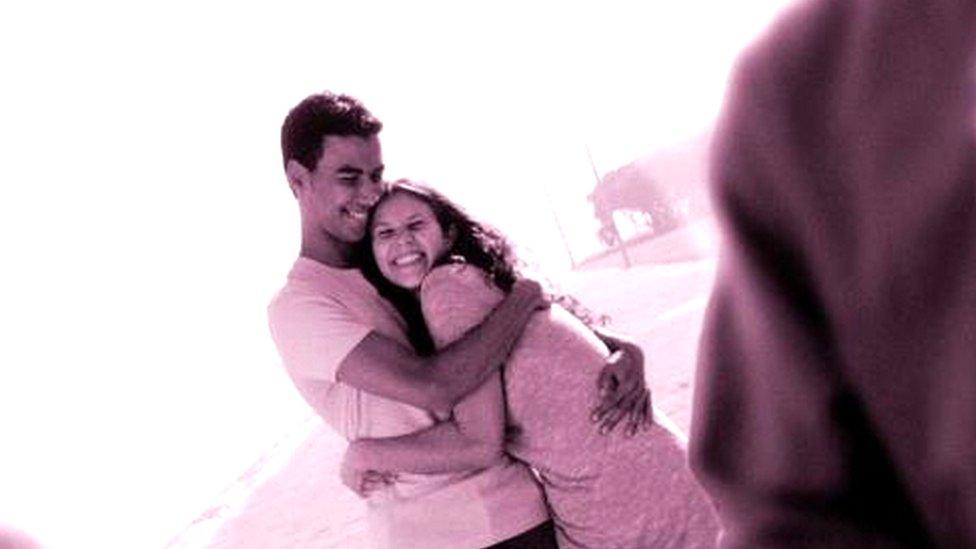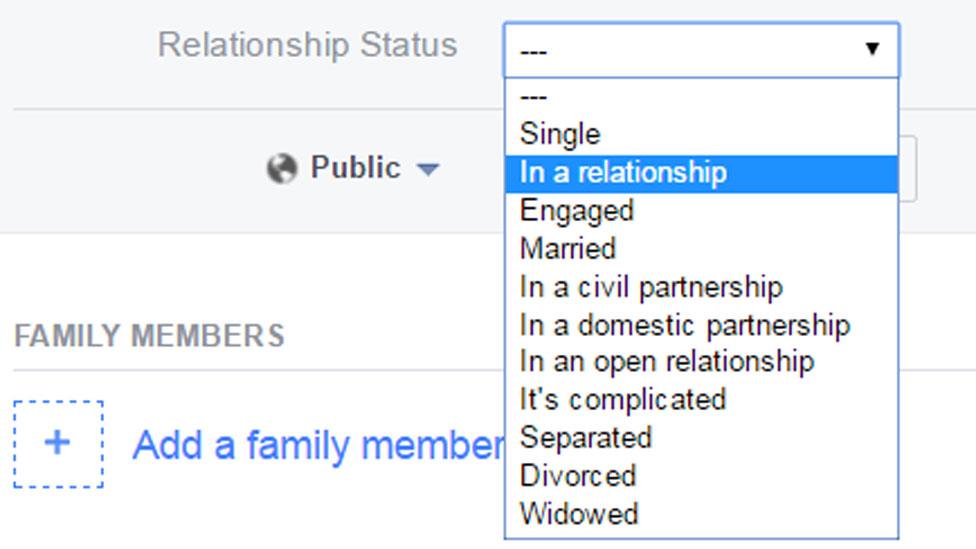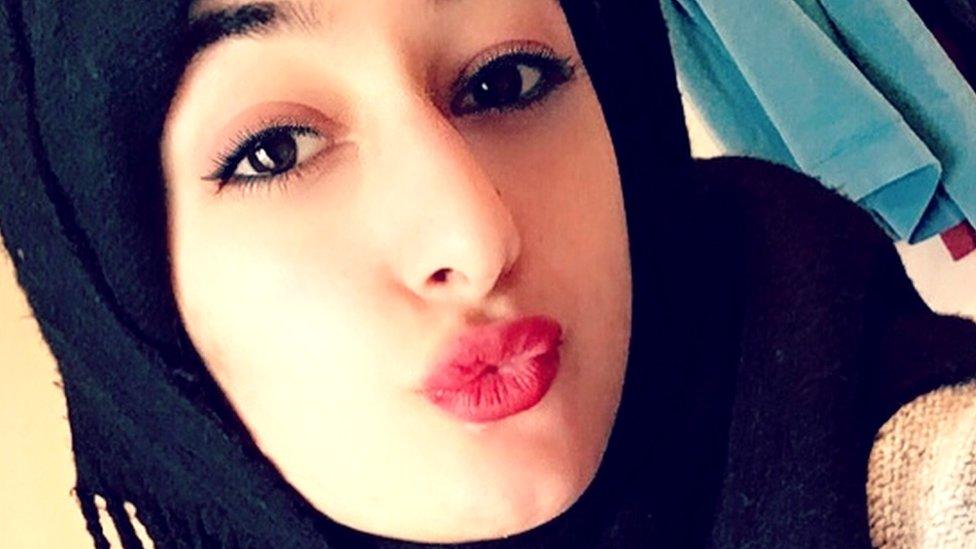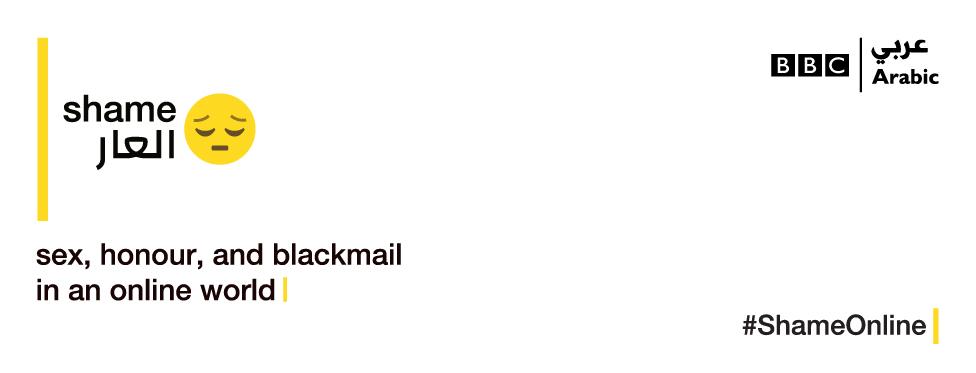Five pictures that show how social media can be a minefield
- Published
WATCH: BBC Arabic staff give their views on the pictures below
Social media can be fraught with risks for women in conservative societies. Pictures that a woman in the West would post without a second thought might, in parts of North Africa, the Middle East and South Asia, be extremely controversial. Here five BBC reporters - all women - explain how the photographs below would be perceived in their countries.
Cuddling up

Alma Hassoun (Syria): Pictures of couples cuddling up in public do not usually appear on Facebook. The girl is the one who worries about posting such a photo. This is mainly because if the relationship does not last, photos that indicate a previous relationship with another man might not be socially tolerated. We should remember that family members and neighbours are on the friends' list.
From what I see on my Facebook feed, I have noticed that the more official the relationship, the more likely such a picture is to be posted. A couple might be together for years, but usually what Facebook followers will see is the engagement photos of them together - if it happens.
But just like all other societies, Syria is very diverse. What "young Syrians" would post or not on their social media pages differs according to the area, educational and social backgrounds, the family and friends' circle, as well as the person's own beliefs and thoughts.
Dancing at a wedding

Amber Shamsi (Pakistan): Some years ago, a mobile-phone video surfaced on the internet of four women sitting on a floor of what looked like a small mud hut, clapping and singing. They wore brightly coloured scarves on their heads. As they sang, two men got up to dance. It seemed innocuous enough but soon became a tragedy.
The video was from a village in a remote mountainous region in Pakistan's north-west. Such mingling of the sexes, the dancing and singing, and worse, the public circulation of the video are all taboo. Reports soon emerged that a council of elders had ordered the women and men to be killed.
When purdah is breached, death seems to be the only way in which honour can be reclaimed. In a sense, breaches of purdah have now extended to the digital sphere too.
In less conservative parts of the country, women do dance and sing at weddings but often male cameramen are asked to switch off their cameras, or the men are sent away.
Status: In a relationship

Sahar Zand (Iran): Increasing numbers of young Iranian couples are now living together before marriage, something which would have been unthinkable a generation ago and is still illegal. Dating apps like Tinder are starting to take off in Tehran and it's suddenly become fashionable for some middle-class girls in the capital to have lots of different boyfriends and to flag up their regularly changing relationship status on social media.
There have been incidents, though, in which young people have been arrested for posting personal information and photographs on social media, so most prefer to keep their accounts anonymous.
That applies to the urban middle class. For the majority of the population, life is much more restricted. Iranian women from conservative and religious families, are unlikely to be posting their relationship status online, or if they do it's likely to be on sites kept far out of sight of their families or the authorities.
Duck face

Sayeda Akter (Bangladesh): If a woman posts a "pouty" selfie on social media feed - Facebook or Instagram - she will not be considered a respectable person. It is only acceptable if the woman is a known personality, such as a TV or film celebrity or a model or singer. In that situation many men will give the image a "like". However, if it is their sister or a family member or a close friend it is not considered acceptable at all.
Sometimes it comes to light that this kind of photograph has been randomly picked up without the owner's permission and used on other sites - such as matrimonial sites - as part of a fabricated biography. I spoke to a student in Dhaka to whom this happened, and who was humiliated and ridiculed both by her university and by her relatives.
Sexy selfie

Sana Safi (Afghanistan): This photo would be considered shameful and inappropriate because a woman here is still considered part of the "honour package", as most people call it, which means her every move is held to have huge implications not just for her future but for the rest of her family too.
Afghan society practises gender segregation, and mixing with the opposite sex is largely limited to the larger cities. The only men a woman can associate with freely are fathers, brothers, grandfathers, brothers-in-law, and uncles.
Afghans also place strong emphasis on a woman's outfit. Removing the headscarf or wearing see-through garments outside the four walls of a home is highly discouraged. Similarly, a woman would be criticised if she shared a picture of herself in her bedroom wearing a T-shirt or pyjamas - and in extreme cases she would be accused of "immorality".
Most women do not have social media profiles. Of those who do, the vast majority do not upload pictures of themselves.

#ShameOnline

This is one of a series of stories looking at a new and disturbing phenomenon - the use of private or sexually explicit images to threaten, blackmail and shame young people, mainly girls and women, in some of the world's most conservative societies. You can explore all the stories and contribute to the conversation here.
